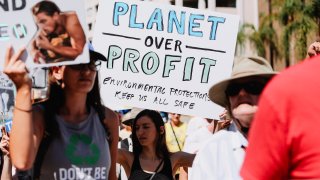
This is an excerpt from CNBC Make It's weekly newsletter. Subscribe here.
Last week, the Labor Department proposed a new rule that would make it easier for employers to offer investments in workplace retirement plans — such as 401(k)s and 403(b)s — that take environmental, social and governance factors into account.
So-called ESG funds have increased significantly in popularity over the past few years as a growing base of consumers opt for investments that align with their personal values. But while the funds are easy to find in an individual retirement account or brokerage account, they are currently rarities in 401(k)s.
There are a couple of reasons for that. For one, under federal law, 401(k) providers must act solely in the interest of the plan's participants. ESG funds are still relatively new, so providers did not know for certain if picking them as an investment option would mean sacrificing returns or taking on more risk compared with an alternate investment choice, like an index fund that tracks the full S&P 500.
Get Tri-state area news and weather forecasts to your inbox. Sign up for NBC New York newsletters.
In recent years, though, more research has come out about the performance of ESG funds, showing that investors aren't necessarily forgoing returns. In fact, the Biden administration's new proposal indicates that ESG factors, particularly the economic consequences of climate change, are actually beneficial for retirement portfolios because they help mitigate long-term risks.
"[C]limate change is already imposing significant economic consequences on a wide variety of businesses as more extreme weather damages physical assets, disrupts productivity and supply chains, and forces adjustments to operations," the Labor Department said. Companies that aren't reliant on fossil fuels, for example, are positioned to perform better in the future, and thus are superior long-term investments than those that do, the argument goes.
A second reason ESG funds are rare is because the former Trump administration was firmly anti-ESG. While it didn't ban workplace retirement providers from offering ESG funds outright, it did institute a rule requiring 401(k) plans and pension funds to make investment decisions based solely on "pecuniary," or economic, factors rather than any other considerations, which made providers hesitant to incorporate ESG into their evaluations. The Biden administration is walking back those restrictions.
Money Report
Basically, it's a win for retirement investors who believe that ESG factors, like climate change or a firm's record on gender and racial equality, make a difference in an investment's long-term outlook, says Aron Szapiro, head of policy research for Morningstar, an investment research firm.
He also says that while one criticism of ESG funds is that they can be more expensive than a typical index fund, the fees have been dropping and will continue to do so, particularly for 401(k) offerings.
The new rule still needs to be finalized, but when it is, plan providers will start to offer funds that take ESG factors into account. Szapiro expects that to happen sometime next year. Those funds would be allowed to become the default investment option in 401(k)s.
"This is a big step, and it's good news for investors," says Szapiro.
If you're interested in learning more about ESG and sustainable investments, CNBC Make It has plenty of resources for you:
- 85% of investors are interested in impact investing—here's how to make your portfolio more sustainable
- Use this free tool to see if your investments are sustainable
- Why 'greenwashing' is an issue for sustainable investments—and how to avoid it
- What you need to know about 'gender lens' investing
- Millennials spurred growth in sustainable investing for years. Now, all generations are interested in ESG options
Sign up now: Get smarter about your money and career with our weekly newsletter






